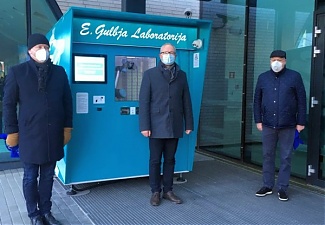Baltic Export, Covid-19, Education and Science, EU – Baltic States, Good for Business, Latvia, Technology
International Internet Magazine. Baltic States news & analytics
Wednesday, 21.01.2026, 22:17
Latvia pioneering an automated coronavirus testing station
 Print version
Print version |
|---|
The machine -- a blue box roughly two meters high and one meters wide -- has tested roughly 500 students and staff since it opened last week at the Pauls Stradins Clinical University Hospital in Riga.
Created by three Riga-based companies, the machine is initially to be used by university hospital employees but the firms are aiming to manufacture more units for other institutions in the capital and rural areas with limited access to testing.
"People who might be infected can avoid contact with medical staff or others at the hospital or our labs, eliminating the risk that they might inadvertently let the infection spread further," said Dr Didzis Gavars, chief scientist at the E. Gulbja Laboratory, one of the developers of the station.
Believed to be the first of its kind, the station offers PCR tests that detect coronavirus RNA.
Operating around the clock, it also affords ease of access that could encourage more people to get tested, Gavars told AFP on Wednesday while demonstrating how the station works.
A one-armed robot inside the station hands coronavirus test to a user standing at its front hatch and then collects samples, storing them in another rack for analysis.
A plexiglass window allows people to watch the robot complete the entire process. A remote control option also allows input from technicians working at labs where the samples are taken to be processed.
People then receive results via email in less than 24 hours.
Gavars said his company sought out local materials to produce the station in order to avoid supply chain problems similar to those experienced in Europe and North America early in the pandemic when masks and other personal protective equipment was slow to arrive from Asia.
- 28.01.2022 BONO aims at a billion!
- 26.08.2021 LLC Dizozols Investments finalizes investment attraction deal with Crowdestor with record-high profits
- 13.02.2021 Моя жизнь в газете. Очерки по новейшей истории Латвии. Глава 1
- 25.01.2021 Как банкиры 90-х делили «золотую милю» в Юрмале
- 30.12.2020 Накануне 25-летия Балтийский курс/The Baltic Course уходит с рынка деловых СМИ
- 30.12.2020 On the verge of its 25th anniversary, The Baltic Course leaves business media market
- 30.12.2020 Business Education Plus предлагает анонсы бизнес-обучений в январе-феврале 2021 года
- 30.12.2020 Hotels showing strong interest in providing self-isolation service
- 30.12.2020 EU to buy additional 100 mln doses of coronavirus vaccine
- 30.12.2020 ЕС закупит 100 млн. дополнительных доз вакцины Biontech и Pfizer








 «The Baltic Course» Is Sold and Stays in Business!
«The Baltic Course» Is Sold and Stays in Business!

